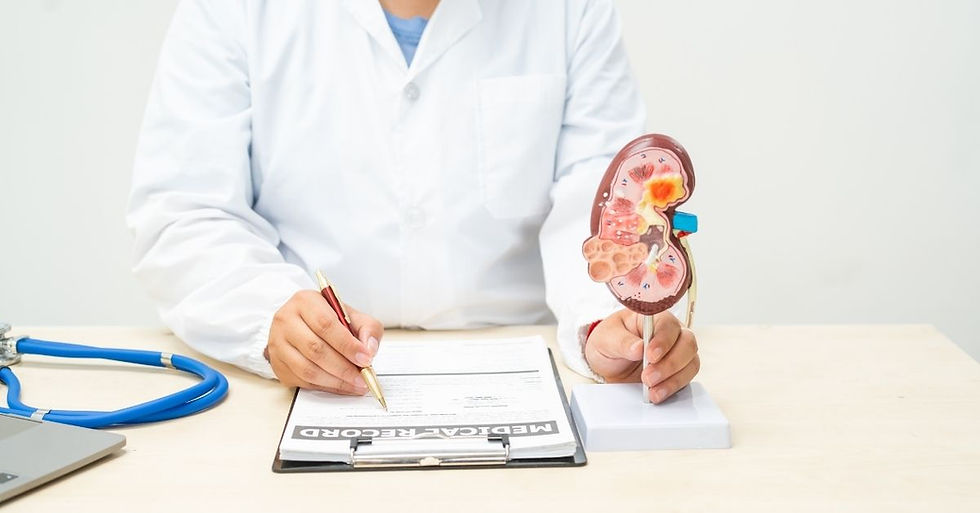Why Do Kidneys Fail Suddenly? 10 Shocking Reasons You Must Know!
- plurefy com
- Mar 22, 2025
- 3 min read

Why do kidneys fail suddenly? What triggers this life-threatening condition? How can you prevent it? In this blog, we’ll explore the 10 shocking reasons for sudden kidney failure, answer frequently asked questions, and provide life-saving insights to help you safeguard your health.
1. Severe Dehydration

Dehydration is one of the most common yet overlooked causes of acute kidney failure. When the body loses excessive fluids due to vomiting, diarrhea, or profuse sweating, the kidneys struggle to filter toxins. This can cause waste buildup and lead to kidney damage.
Prevention Tip:
Stay hydrated by drinking at least 8 glasses of water daily.
Avoid excessive caffeine and alcohol, which contribute to dehydration.
2. Drastic Drop in Blood Pressure (Hypotension)

Kidneys depend on steady blood flow to function correctly. If blood pressure drops suddenly due to shock, severe infections, heart failure, or massive blood loss, the kidneys may fail to receive enough oxygen and nutrients, leading to acute kidney failure.
Warning Signs:
Dizziness or fainting
Blurred vision
Extreme fatigue
Prevention Tip:
Manage low blood pressure with proper medical guidance.
If you have a history of hypertension, monitor your BP levels regularly.
3. Severe Infections & Sepsis

Infections, particularly urinary tract infections (UTIs), pneumonia, or bloodstream infections, can lead to a deadly condition called sepsis. When infection spreads rapidly through the bloodstream, it causes systemic inflammation that may damage the kidneys suddenly.
Prevention Tip:
Get timely vaccinations to prevent infections.
Seek immediate medical care if you develop fever, chills, or confusion.
4. Use of Certain Medications

Some medications can be toxic to the kidneys, leading to sudden kidney failure. These include:
Nonsteroidal anti-inflammatory drugs (NSAIDs) like ibuprofen and naproxen
Antibiotics such as aminoglycosides
Chemotherapy drugs
Contrast dyes used in medical imaging
Prevention Tip:
Always consult your doctor before taking new medications.
Avoid self-medication and excessive painkiller use.
5. Kidney Stones Blocking Urinary Tract

A sudden blockage in the urinary tract due to kidney stones, tumors, or an enlarged prostate can cause urine backup. This puts excessive pressure on the kidneys, leading to acute kidney failure.
Prevention Tip:
Drink plenty of water to prevent kidney stone formation.
Consume a low-sodium, low-oxalate diet.
6. Autoimmune Diseases (Lupus, Vasculitis)

Autoimmune disorders like lupus nephritis, vasculitis, and Goodpasture’s syndrome attack the kidneys, causing sudden inflammation and failure.
Prevention Tip:
Manage autoimmune conditions with prescribed medications and regular health checkups.
7. Rhabdomyolysis (Muscle Breakdown)

Severe muscle injury, excessive exercise, or crush injuries can release myoglobin (a muscle protein) into the bloodstream. Myoglobin is toxic to the kidneys and can trigger acute kidney failure.
Prevention Tip:
Avoid over-exercising or extreme workouts without proper hydration.
8. Severe Heart Failure (Cardiorenal Syndrome)

When the heart fails to pump blood efficiently, kidney function may decline rapidly. Heart failure, heart attacks, and severe arrhythmias can lead to reduced kidney perfusion and failure.
Prevention Tip:
Manage heart disease risk factors like high cholesterol and obesity.
9. Uncontrolled Diabetes & High Blood Sugar

High blood sugar levels damage kidney blood vessels, causing diabetic kidney disease. Sudden spikes in blood sugar can lead to acute kidney failure.
Prevention Tip:
Monitor blood sugar levels regularly.
Follow a low-sugar, kidney-friendly diet.
10. Severe Allergic Reactions (Anaphylaxis)

Life-threatening allergic reactions can cause a sharp drop in blood pressure and reduced kidney perfusion, leading to sudden kidney failure.
Prevention Tip:
If you have allergies, carry an EpiPen and avoid known allergens.
FAQs on Sudden Kidney Failure
1. Can sudden kidney failure be reversed?
Yes, acute kidney failure can be reversible if diagnosed and treated early. Immediate medical intervention is crucial.
2. How long can a person live with kidney failure?
Without treatment, kidney failure can be fatal within days or weeks. With dialysis or a kidney transplant, survival can be prolonged for many years.
3. What are the first signs of sudden kidney failure?
Decreased urine output
Swelling in legs or face
Extreme fatigue
Confusion and dizziness
Shortness of breath
4. Who is at higher risk of acute kidney failure?
People with diabetes or high blood pressure
Those with chronic kidney disease (CKD)
Individuals taking NSAIDs or antibiotics frequently
Elderly individuals
5. What should I do if I suspect sudden kidney failure?
Seek emergency medical help immediately!
Stop taking any harmful medications.
Stay hydrated but avoid overhydration.
Conclusion : Kidneys Fail
Acute kidney failure is a life-threatening condition that can strike suddenly and without warning. Understanding the causes—such as dehydration, infections, medications, and diabetes—can help you take proactive steps to protect your kidneys.
If you experience symptoms like decreased urine output, swelling, confusion, or extreme fatigue, don’t ignore them! Seek urgent medical care to prevent complications.
By making healthy lifestyle choices, staying hydrated, and managing chronic conditions, you can significantly lower your risk of sudden kidney failure. Your kidneys work 24/7—take care of them before it’s too late!
Stay informed. Stay healthy. Share this article to raise awareness!










Comments